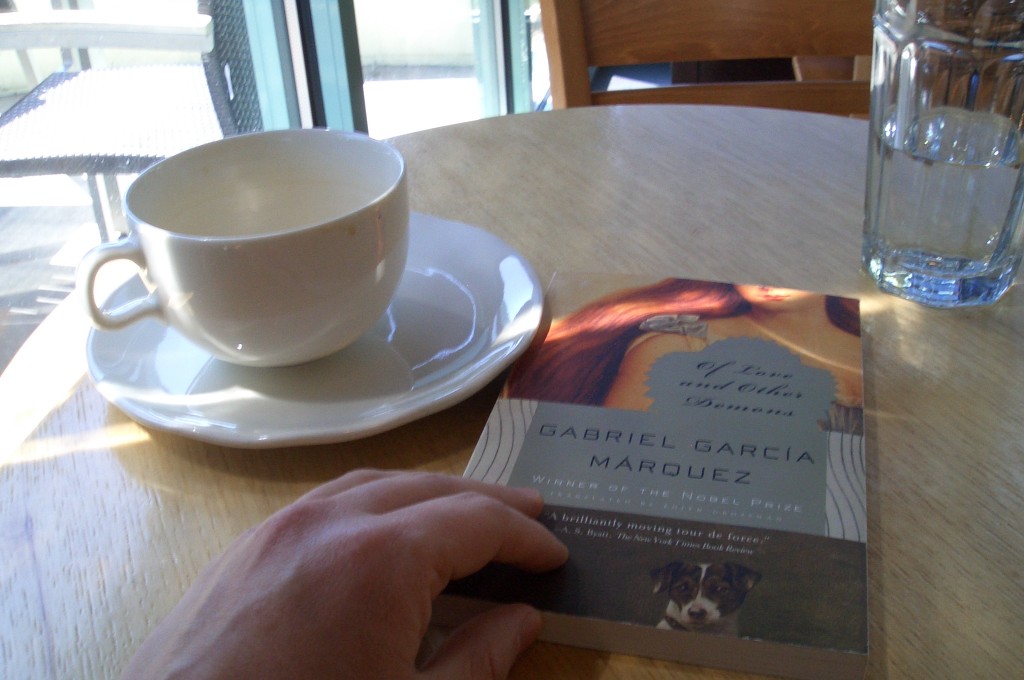“You people have a religion of death that fills you with joy and courage to confront it,” he said. “I do not: I believe the only essential thing is to be alive.”
There is no more private experience than reading a great book in a public place, especially when closing in on the final paragraphs. You begin to hear the low roar of the material world you will soon be rejoining, and for the first time perceive that the narrative fabric you had drawn about you, so close as to nearly mistake it for yourself, is in fact, separate, temporal. Against your impending separation, a sort of preemptive nostalgia sets in.
Such was I at Starbucks, about to be expelled from Gabriel Garcia Marquez’s bronze-bright elegy, Of Love and Other Demons, into that uniquely American environment, the corporate comfort spot, a three-dimensional cartoon of a soulful gathering place. The un-named New World port of Garcia Marquez’s 1994 novel, whose harbor democratically floats both moribund slave ships and vessels baring Spanish viceroys, and whose nearby hills yield up rabid monkeys ready, at the sound of the Te Deum, to storm the cathedral, had far more to do with life than the faux-suade bench on which I sat with my “for here” cup of coffee, surrounded by the humorless lap-top crowd (which, as a new blogger, I have recently, ambivalently, joined ). I was about to turn the last page on this story of an ill-fated marquise, a twelve year old girl with stupendous copper-colored hair, and her lover, a bookish priest whose life she had just spent half the book upending, when I came upon the above statement, about a “religion of death,” and how the “essential thing is to be alive”.
As it happened, I was reading, concurrently, Ernest Becker’s The Denial of Death. Becker, a cultural anthropologist steeped in post-Freudian theory, argues that denial of death is not only ubiquitous, but necessary. We come apart at our weakly stitched seams at the very idea of oblivion, and so we gird ourselves with other ideas, such as “work”, “family”, “religious belief” “sex”. We construct from them a kind of boundary drawn against the abyss, a world in which we can be our own heroes, giving us the happy illusion of immortality. They become our “immortality projects”. For Becker, the measure of mental health is not how completely one is able to throw over illusions and stare into the dark, but how well one chooses the illusions by which one lives.
With those two sentences, there on the penultimate page of Of Love and Other Demons, the novel introduced itself to the work of psychoanalytic philosophy with which it had been sharing mind space, and it finally occurred to me that Garcia Marquez’s characters are all embroiled in immortality projects. They practically pulse with need – for love, for power, rectitude, freedom, or the production of their own bile, heroic endeavors all, stroked by each to secure a promise of continuance. The statement is delivered to the love-infested Father Cayetano Delaura by Doctor Abrenuncio de Sa Pereira Cao, a Portuguese Jew who had fled to the Caribbean to escape the great “Iberian persecution”. Which is to say, he enters the picture as acquainted with death as any, and better than most. Certainly better than the Spanish colonials with whom he interacts, who tend to be either deliquescent aristocrats, or religious, sequestered behind the walls of their order. The doctor’s irony rings clear: He observes to Delaura that his “religion of death” gives him, and his people, a kind of death-seeking gusto, as if death was a prize. But Abrenuncio understands that a genuine reckoning with death can lead one only to the conclusion that living, when it comes down to it, is what there is to live for. All the rest – love, God, pleasure, revenge, altruism, or even romantic and religious notions of death – are only satellites of meaning circling the living exclusively. The dead need not trouble themselves.
He brings a clear-eyed view of life’s brutishness to the case of the beautiful young Marquise, Sierva Maria, who, weeks after being bitten by a rabid dog, remains free of symptoms, but heavy with projections. Every character she encounters finds her possessed of a formidable, sinister power, and makes her over into the ideal catalyst for his or her immortality project. To Josefa Miranda, Abbess of the convent of Santa Clara, who has been ordered by the Bishop to keep Sierva Maria sequestered while awaiting exorcism, it is the power of Hell itself: She cites as evidence of the precocious twelve year old’s demonic possession her ability to turn invisible, and to sing with inhuman beauty. Her preternatural tresses, jewelry from her father’s slaves, and the inciting fascination she exerts on the sisters don’t help her case. Who better than one demon-possessed to focus the Abbess’s quest for holiness through earthly order? To Sierva Maria’s appointed exorcist, Father Delaura, mild-mannered, living in a scholastic cloud, yet with a high passion for forbidden books, her’s is a power, not to be resisted, but to be conceded to, promising a scarcely imagined fulfillment to all his secret longings – erotic, yes, but more the desire to transcend order altogether.
Father Delaura comes on the scene a third of the way through the novel, and only meets Sierva Maria slightly past the half-way mark. Up to this point, Garcia Marquez presents the titular demon as an artifact of the neurotic colonial and religious world view, the chimeric spawn of imperial anxiety and Catholic repression. But as the priest and the alleged possessed begin their labors together, the demon becomes something more palpable, not so tidily managed by our righteous enlightenment. It emerges that Love is the demon who beleaguers every character in the book, with the possible exception of the Doctor, and even he does not escape its galvantic weather system.
So, how does love, what the song rightly says the world needs now, turn demonic? For all its gifts, we have each, at some point, experienced it as such. For one thing, Love is the ultimate immortality project. This is not in itself a negative, and Love is, of course, many other things as well, but one need only watch The Umbrellas of Cherburg, and hear Catherine Deneuve and Nino Castelnuova sing to each other, ad nauseum, “Pour un millier d’étés, je vais attendre pour vous/ Si ça prend une éternité, je vais attendre pour vous” (“For a thousand summers, I will wait for you/If it takes forever, I will wait for you”) to be reminded of the authority Love has, in fantasy, to bestow immortality on those who give themselves over to it. Love, in all its guises, is one of the human race’s most ubiquitous heroic endeavors, and as we battle out our lives, the more prominently we bear cupid’s wounds, the more assured we feel of our immortality. All of us, however expensively bought our cynicism, however sound our repudiations, all of us cleave to the belief that the Beloved can be our salvation, that death will not part us, but be our gateway to eternity. Each of us is a little Isolde, singing our liebestod at the top of our collapsing lungs.
Well. I could go on about the treasures in this novel. Perhaps I’ve written enough here to account for my reluctance to re-enter the Starbucks present. I hope to pick up here in a future post and explore further Love’s impact on these souls. For now, I’ll leave you with with a short passage from the book, an exchange between the Bishop and his much loved assistant, the ill-fated Father Delaura. As a violent storm rages outside, the Bishop expresses his homesickness for Spain:
“How far we are!”
“From what?”
“From ourselves,” said the Bishop. “Does it seem reasonable to you that a man should need up to a year to learn he is an orphan?” And since there was no answer, he confessed to his homesickness: “The very idea that they have already slept tonight in Spain fills me with terror.”
“We cannot intervene in the rotation of the earth,” said Delaura.
“But we could be unaware of it so that it does not cause us grief,” said the Bishop. “More than faith, what Galileo lacked was heart.”
Delaura was familiar with these crises that tormented the Bishop on nights of melancholy rain ever since old age had assailed him. All he could do was distract him from the attack of black bile until sleep overcame him.


